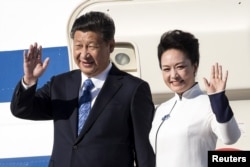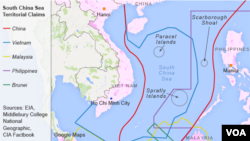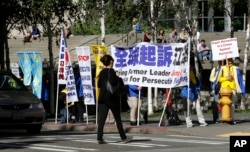Chinese President Xi Jinping is calling for better relations with Washington to help prevent what he said would be disastrous conflict between the two nations, as he begins his week-long tour of the United States.
The comments came Tuesday during a much-anticipated policy speech to business leaders in Seattle, the first stop on a trip that will culminate later this week with the Chinese leader's first state visit to the White House.
"If China and the U.S. cooperate well, they can become a bedrock of global stability," Xi said. "Should they enter into conflict or confrontation, it would lead to disaster for both countries and the world at large."
Open to cyber dialogue
The Chinese leader also addressed a wide range of other issues that have upset U.S.-China ties, including cyber hacking, which President Barack Obama has said will figure prominently in their one-on-one talks.
"The Chinese government will not in whatever form engage in commercial theft or encourage or support such attempts by anyone," Xi said, repeating Beijing's assertion that it is the victim, not perpetrator, of such attacks.
China is willing to set up a "high-level joint dialogue mechanism with the U.S. on fighting cybercrime," Xi said, in an apparent attempt to reassure business leaders alarmed about the growing threat of cyberattacks.
He also said China will not lower the value of its currency to boost exports. That is a longstanding worry among many U.S. officials, made worse by Beijing's surprise recent devaluation of the yuan.
Tense talks expected
Xi and Obama are expected to have intense talks about cyber espionage and economic issues during the Chinese leader's state visit to the White House on Friday.
The U.S. will press China to avoid "quick fixes" for its economy such as devaluing the yuan to help its exporters, White House chief economist Jason Furman said Tuesday.
Furman said China's recent loosening of controls on the yuan "caused turmoil" in global financial markets and that U.S. officials also would raise the issue of China's volatile stock market.
Ahead of Xi's visit, top U.S. officials have been more vocal about condemning Beijing-sponsored cyber espionage, calling it a major stumbling block to U.S.-China relations.
"We are increasingly hearing concerns about activities that the Chinese been engaged in," said U.S. Deputy National Security Advisor Ben Rhodes. "So we want to make it very clear this puts at risk China's ability to continue on its growth if businesses don't have confidence they won't be subjected to cybertheft."
U.S. officials have suggested imposing sanctions on Beijing, and the president said Washington is preparing "a number of measures" aimed at showing Beijing that "this is not just a matter of us being mildly upset."
South China Sea
Another area of possible disagreement is China's controversial territorial claims in the South China Sea.
In his speech Tuesday, Xi stressed that China does not want confrontation with other nations, and does not want to impede freedom of navigation in the region.
"Let me repeat: No matter how developed it becomes, China will never seek hegemony or seek expansion," he said.
China has been carrying out land reclamation projects, as well as building civilian and military facilities, in the Spratly Islands chain, parts of which are also claimed by the Philippines, Vietnam, Malaysia, Brunei, and Taiwan.
Earlier this week, Xi told The Wall Street Journal that the Spratly Islands have been Chinese territory since ancient times.
"China's development and maintenance of facilities on some of our garrisoned islands and reefs in the Nansha islands does not impact on or target any other country, and it should not be overinterpreted," Xi told the paper.
The U.S. has demanded China stop those activities, calling them out of step with international norms and a risk for sparking conflict in the region.
Human rights
China's human rights record is another source of friction with the U.S., and the topic is likely to come up throughout Xi's visit.
As the Chinese leader spoke Tuesday in Seattle, dozens of protesters gathered nearby to condemn what they see as Beijing's harsh policies in Tibet and its crackdown against other political dissidents.
He is also likely to experience protests in Washington, where several groups plan to hold demonstrations near the White House, and in New York, where Xi plans to address the U.N. General Assembly.
National Security Advisor Susan Rice said earlier this week U.S. officials will continue to push China to stop detaining activists, to allow more freedom of speech, and to eliminate restrictions on religious practices.
But similar statements in the past have been dismissed by Beijing, with little noticeable progress. And there is no indication that Obama intends to give human rights concerns any more priority in the current meetings.
"It's absolutely true that it's a big and complicated relationship, and so there are a lot of topics vying for attention," acknowledged Sophie Richardson, China director at Human Rights Watch. "But we certainly think that the deterioration of the rights situation in China under Xi merits special attention."
"We also try to remind people that the same laws and independent institutions in China that would better protect human rights, like an independent court system, respect for the freedom of expression, are also essential to a healthy trade relationship and better diplomatic partnering, and many other aspects of the relationship," she told VOA.
VOA's Victor Beattie contributed to this report.







